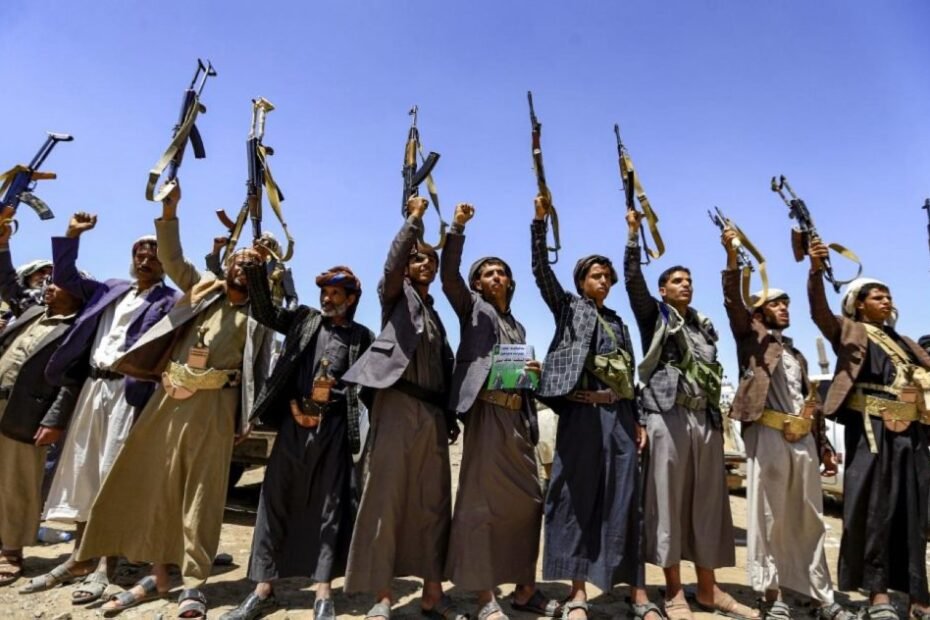a significant development in the Middle East, Iran-backed Houthi rebels have vowed to retaliate after a new round of airstrikes by an international coalition, including the United Kingdom, targeted at least 30 Houthi targets across more than a dozen locations in Yemen. This comes just a day after the United States launched retaliatory airstrikes against Iran-backed militias in Iraq and Syria, following a deadly drone attack on U.S. troops in Jordan that left three American service members dead.
Global Coalition Strikes Houthi Targets
The international coalition, led by the U.S. and the U.K., launched a joint operation targeting Houthi rebels in Yemen. The strikes, approved by President Biden, hit 36 targets across 13 different locations. The coalition included countries such as Australia, Bahrain, Denmark, Canada, the Netherlands, and New Zealand, signaling widespread diplomatic support for the action.
The targets encompassed a range of facilities, including underground storage facilities, command and control centers, missile systems, UAV storage, operation sites, radars, and helicopters. The broad scope of the operation aimed to degrade Houthi capabilities, particularly their continued attacks on international shipping, which have been deemed unacceptable by the coalition.
International Response and Coalition Dynamics
The coalition’s actions underscore a collective determination to address the threat posed by the Iran-backed rebel group. The strikes are not only a response to recent Houthi attacks but also a broader effort to safeguard international shipping routes, critical for the global economy. The involvement of various nations reflects the gravity with which Houthi attacks on shipping have been viewed globally.
The collaborative effort with the United Kingdom for the third time emphasizes the joint commitment to curbing Houthi aggression. The U.S. and its allies aim to deter further attacks on international shipping, signaling a united front against Iran-backed rebel groups.
Retaliation and Houthi Response
Despite the coalition’s efforts, the Houthi rebels have vowed to retaliate, claiming that they will meet escalation with escalation. This rhetoric indicates that the airstrikes may not have deterred the rebel group, and they remain defiant in the face of international intervention.
The Houthi response is rooted in their assertion of withstanding previous conflicts and their commitment to continuing their fight. They attribute their actions to supporting the Palestinians in Gaza, using regional dynamics to justify their stance. The Houthi narrative revolves around creating terms for a cease-fire that align with their objectives, potentially strengthening groups like Hamas and weakening U.S. interests in the region.
U.S. Strategy and Ongoing Operations
The Biden administration’s strategy involves a calibrated series of strikes, aiming to both deter further aggression and avoid unnecessary escalation. The recent strikes in Yemen and the broader campaign against Iran-backed militias in Iraq and Syria indicate a willingness to take action while carefully managing the risk of increased hostilities.
Defense Secretary Lloyd Austin has warned that if attacks on international shipping persist, strikes on Houthi weaponry will continue. The U.S. administration acknowledges the complexity of the situation, recognizing the need to address the immediate threats while considering the broader regional implications.
Analysis and Future Implications
The effectiveness of the coalition’s strikes remains a subject of analysis, with considerations given to the underground nature of some Houthi targets. The U.S. and its allies are likely monitoring the impact of the strikes on Houthi capabilities, determining the success of their efforts to degrade the rebel group’s military infrastructure.
The broader implications of these developments include the potential for an extended low-grade campaign in the region. The Biden administration’s approach involves a combination of military action, intelligence gathering, and diplomatic efforts to shape the behavior of Iran-backed groups. The dynamic nature of the situation requires continuous assessment and adaptation of strategies to achieve long-term stability in the region.
In conclusion, the recent escalation in the Middle East reflects the complexities of dealing with Iran-backed militias and rebel groups. The coalition’s actions, coupled with the Houthi vow to retaliate, set the stage for ongoing geopolitical tensions. The Biden administration’s response underscores a commitment to addressing immediate threats while navigating the delicate balance between deterrence and de-escalation in a volatile region.
